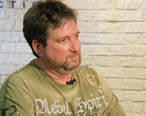News
( Archive )
http://cinefex.ru/articles/detail.php?ID=3437
Interview with Savva`s scriptwriter Gregory Poirier
October 18th, 2010
1. What role does the script writer play in creation of a film?
The screenwriter is responsible for taking the overall ideas and character sketches and turning them into a well structured, entertaining and comprehensible story featuring identifiable and multi-layered characters. In a case like Savva, where the screenwriter is hired after the director and producer have already laid out the basic story, he serves as both an artist and a technician. Artistically, he finds the music of the piece and explores the comic and dramatic possibilities; simply put, he entertains. As a technician, his job is to make sure the script is crisp, well structured and commerically viable.
2. Are you using any up-to-date software for script writing?
I use the latest version of Final Draft. There is another software, called Scriptware, which I consider to be vastly superior to Final Draft in its ease of use and which I far prefer, but Final Draft has become the standard of the industry and so I have to work with it.
3. Do you have any special rules in your work? For example: to write that much of pages and the like?
I have several self-imposed rules and regulaitons. Not all writers are the same, but I believe most of us have to impose self discipline on ourselves to get anything done. I set myself a minimum of five pages per work day, and I meet it no matter what. Even if the pages are terrible and will need to be rewritten later, I get the five pages out and written down. If I do more than five pages that's great, and sometimes I do many more, but no matter how many I do the next day I still owe myself five pages.
Another trick that I use is that before I start new pages each day, I go back and rewrite the pages from the day before. This is like a warm up for me; it gets my mind back into the story and the world of the film, and it acts like a freeway on ramp... I can get up to speed before I start writing fresh pages. I have always done it this way and it really helps.
I am what you might call a roving writer; I do most of my writing outside in my garden, and I move around frequently. If my mind starts to bog down, I often find that simply moving to a new section of the garden can start it up again. I also play pool. I have a pool table in my home, and when my mind gets stuck I knock the balls around. Billairds is a very zen experience; all of your concentration is on what you are doing physically, and what your strategy is. It frees my mind completely from the writing and any other outside concerns, and often this is enough to get me unstuck.
4. What famous authors influenced your creativity?
Do you have any idols? I have a wide range of idols, from movies to books. My favorite screenwriters are probably Preston Sturges, Sterling Siliphant, and the team of Billy Wilder and I.A.L. Diamond. I admire them for the deceptive simplicity of their scripts, which seem to be breezy and easy, but are actually quite rigorously structured and deep. Recently, after seeing Inception, I would have to say I have become a great admirer of Christopher Nolan. In books, I am greatly influenced by Kurt Vonnegut, Jr, but my biggest inpiration would be hard boiled fiction writers like John D. MacDonald and Raymond Chandler.
5. What do you think one needs to be a prosperous script writer: talent, professional skills, luck?
Frankly, all of the above. Talent is essential, but a strong grasp of the technical intricasies of screenplays is also very important. And luck obviously plays a part, although I think it is less important than the others, and it is definitely less important than most vital ingredient; perseverance. I have always joked that the only people who ultimately make it in Hollywood are the ones who are too stupid to give up and go home.
6. You've wrote the script to movie "National treasure: The book of Secrets".If it's not a secret, how much time did you spend on it's creation? Which in succession script did the film studio approve?
I worked on this film for approximately 18 months. If you've seen it you know that it is a very complicated film, which went through a succession of writers. While I was the first writer and the originator of the story, there were several wonderful writers who worked on it after I did. This is common for a film of this size.
7. Give us some scope of the main differences in work on the animation film and on the feature film?
I approach the two in very much the same way. While the physical aspects of the world may be freer in animation, ultimately you need an interesting, satisfying story with characters we truly care about.
8. How did you get on the Russian project "SAVVA"?
The producer and director approached the William Morris Endeavor agency seeking a high profile, English speaking writer to work with. My agent, Danny Greenberg, sent me the material and as soon as I saw it I knew I wanted to work on this film. I presented my thoughts for the adaptation to Max and I was fortunate that he responded well to my ideas.
9. What are the difficulties that you come across while adapting the Russian script for the American audience?
I wouldn't catagorize them as difficulties, but there are challenges. I think the major thing is to make something that is accessible by finding the common human experience that we can all identify with. Expanding the humor and making sure that it doesn't lose its essence in Russian folklore while also making sure it plays to a worldwide audience is important. But without that common human experience that we all share, which in this case presents itself in the emotional journey of the hero, Savva, the rest would be meaningless.
10. What do you think will the project Savva have success in international film distribution?
Well, I sure hope so! Not only for this film, but I really like working with Glukoza Productions and would like to be involved in more projects with them. So this had better be a hit!

